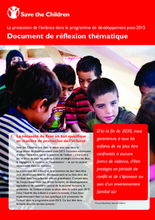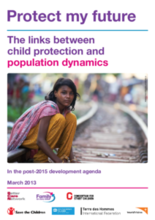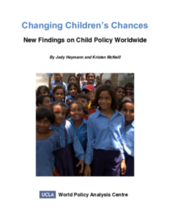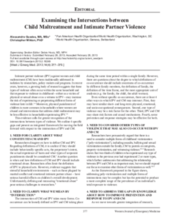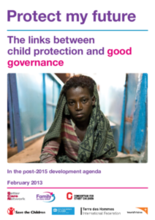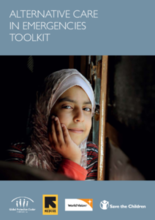Displaying 3721 - 3730 of 4424
Le programme de développement post-2015 devrait notamment garantir que tout appel à un renforcement des financements des programmes de protection sociale servent à consolider les services de base fournis aux familles - et non aux institutions ou orphelinats - pour mieux soutenir celles-ci dans la prise en charge et la protection de leurs enfants.
This paper is part of an inter-agency series on the links between child protection and major development goals. The report focuses on the links between child protection and population dynamics as they relate to the post-2015 Millennium Development Goals agenda.
This new report by the World Policy Analysis brings together key findings from the book, Children’s Chances: How Countries Can Move From Surviving and Thriving, providing a global picture of what laws, policies, and programs countries have in place to address areas vital to children’s healthy development.
Zero to Three, a US based non profit organization working to inform, train and support professionals, policy makers and parents to improve the lives of infants and toddlers, combined the evidence from research on early childhood development with feedback from focus groups with families, friends, and neighbors who act as care givers to develop a range of practical resources to strengthen care practices with children between the ages of 0 and 3.
In this editorial, the authors outline four specific gaps in evidence on the connections between intimate partner violence (IPV) and child maltreatment (CM) and present an integrated framework for moving the field forward with respect to the intersection of IPV and CM.
The aim of the article is to compile inquiries into abuse and neglect in out-of-home care that have been conducted worldwide in order to frame the historical context in which these inquiries and truth commissions were set up.
To consider the appropriateness of baby hatches, this article presents and examines the validity of each major objection to establishing baby hatches.
FairStart Training is a free 15 step online program developed by a child psychologists in Denmark, in collaboration with a team of childcare professionals, with support from the European Commission. It is a development program that aims to improve the professional care giving skills of those working with young people in public care (focused on children aged 0-3) through daily practices and organizational development.
This paper is part of an inter-agency series on the links between child protection and major development goals. The report focuses on the links between child protection and good governance as they relate to the post-2015 Millennium Development Goals development agenda.
The Alternative Care in Emergencies Toolkit is designed to facilitate interagency planning and implementation of alternative care and related services for children separated from or unable to live with their families during and after an emergency.

